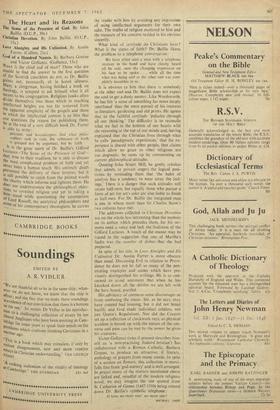The Heart and its Reasons
The Sense of the Presence of God. By John Baillie. (O.U.P., 30s.) Love Almighty and ills Unlimited. By Wilda is the chief end of man? Those who are unable to find the answer to the first question of the Scottish catechism do not, as Dr. Baillie Points out, necessarily sit in bored idleness. Many a clergyman, having finished a book on theology, is tempted to ask himself what it all means to his congregation. Religious books often divide themselves into those which in reaching intellectual heights are too far removed from the apparent simplicity of the gospels and those in which the intellectual content is so thin that one questions the reason for publishing them.
at the end of a very difficult book Dr. Farrer Is able to write:
Peasants and housekeepers find what philo- sophers seek in vain; the substance of truth is grasped not by argument. but by faith. It is the great merit of Dr. Baillie's Gifford Lectures—The Sense of the Presence of God— that, true to their tradition, he is able to discuss the most complicated problem of faith and yet never loses a human touch. His untimely death prevented the delivery of these lectures, but it is still possible to catch from the printed words the charity which informs and lightens them. He u.oes not underestimate the philosophical objec- 2Ons to revealed religion and yet in taking a ITT" stand while questioning the assumptions 8°: Lord Russell, the analytical philosophers and me of his contemporary theologians, he carries
the reader with him by avoiding any impression of using intellectual arguments for their own sake. The truths of religion mattered to him and the measure of his concern resided in his obvious sincerity.
What kind of certitude do Christians have? What is the status of faith? Dr. Baillie likens the problem to a telephone conversation :
We have often seen a man with a telephone receiver in his hand and have clearly heard all he said, seen the changing expression on his face as he spoke . . while all the time what was being said at the other end was com- pletely inaudible to us.
It is obvious to him that there is somebody at the other end and Dr. Baillie does not expect the soul to get a dusty answer. Like Wordsworth, he has felt 'a sense of something far more deeply interfused' than the mere pursuit of his interests in literature, gardening and old prints. He agrees that to the faithful certitude `pulsates through all our thinking.' The difficulty is to reconcile what we feel in the bottom of our hearts with the reasoning at the top of our minds and, having explained that the Christian lives through what he calls 'paradigmatic experiences,' that his ex- perience is shared with other people, that claims which allow no grace to other religions are too dogmatic, he sums up by commenting on current philosophical attitudes.
Quoting John Stuart Mill, he gently rebukes (but admits to private anger) the logical posi- tivists by reminding them that 'the habit of analysis has a tendency to wear away the feel- ings.' There is a danger that such attitudes will create half-men, but equally those who pursue a form of art for art's sake are also liable to finish as half-men. For Dr. Baillie the integrated man is one in whom more than Sir Charles Snow's two cultures have met.
The addresses collected in Christian Devotion are on the whole less interesting than the memoir on its author which precedes them, for his ser- mons need a voice and lack the liveliness of the Gifford Lectures. A touch of the manse may be traced in the suggestion that one of Martha's faults was the number of dishes that she had prepared.
In spite of his title, in Love Almighty and ills Unlimited Dr. Austin Farrer is more obscure than usual. Discussing Evil in relation to Provi- dence he does not let all so many of the pen- etrating examples and asides which have pre- viously distinguished his writings, He is so con- cerned to avoid sentiment that when he has knocked down all the skittles we are left with the bare board, puzzled.
His advocacy of common sense discourages us from confusing the issues. Sin, as he says, may have created bad housing, but it did not breed bacilli, and God made individual soldiers, not just Queen's Regulations. Nor did the Creator set up a collection of clockwork toys, so physical accident is bound up with the nature of the uni- verse and pain can be met by the power he gives his creatures.
Victor Gollancz (who if pressed describes him- self as 'a non-practising Judeo-Christian') has collaborated with a Roman Catholic, Barbara Greene, to produce an attractive, if literary. anthology of prayers from many creeds. In spite of a section on flowers, this collection is merci- fully free from 'god-wottery' and is well arranged. In prayer many of the matters mentioned above are linked and, mindful of the modern religious novel, we may imagine the one quoted from St. Catherine of Genoa (1447-1510) being uttered down Dr. Baillie's symbolic telephone:
0 love, no more sins! no more sins!
WO-PAH. TREF






































 Previous page
Previous page